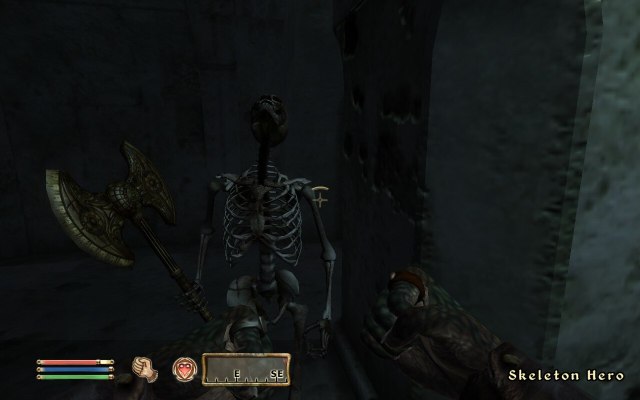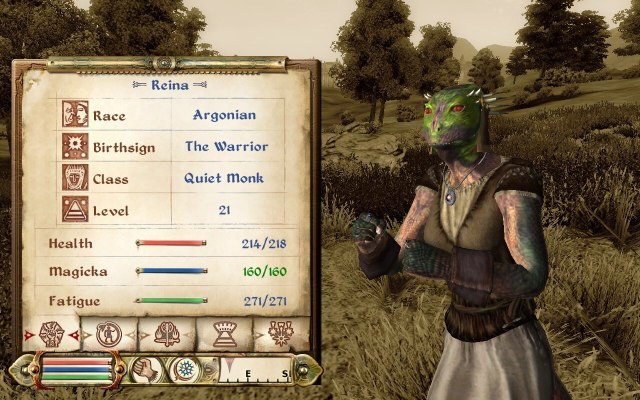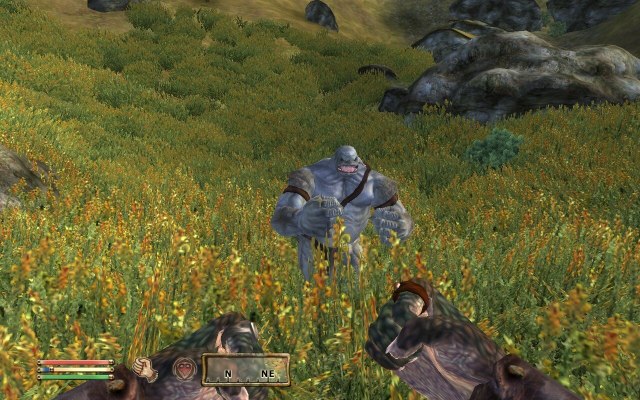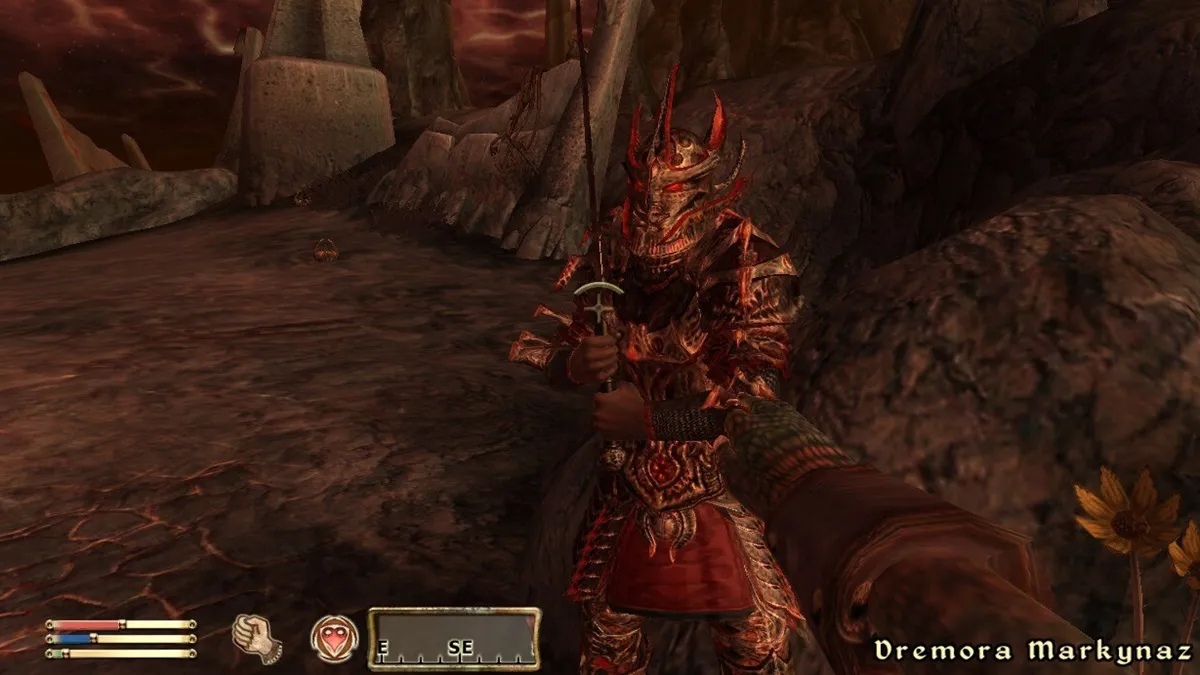I was seven or eight years old when I first booted up The Elder Scrolls IV: Oblivion on my dad’s Xbox 360. This was before I knew the term “RPG” or even understood the scope of its sprawling open worlds. Countless playthroughs began and died as I fumbled through Cyrodiil, only to start over again.
That was around 2006, and I really began appreciating Oblivion when I played the 5th Anniversary Edition on PS3 some years after. Sure, I ran through it on PC eventually, but it sat in my library for ages, a childhood memory awaiting its chance to shine again.
Then I got my Steam Deck and reinstalled Oblivion as a bit of a joke. Its PC version doesn’t offer official controller support, but I keep it installed everywhere else, so why not on my handheld? The idea of portable Oblivion began nagging me in the days since, especially as Valve gave it the “Playable” designation. It’s not the esteemed “Verified” status, but it was something.
But that’s all it took, and now, most of my free time gaming in the past few weeks has since been with Oblivion on my Deck. For the first time since I was a teeny tiny girl who could barely read, Oblivion was my obsession.

Oblivion on Steam Deck has some growing pains
It was honestly a small hurdle acclimating to Oblivion‘s controls on the Steam Deck. As mentioned, the PC version doesn’t support controllers, so I tried its community-sourced controller scheme.
It’s pretty much like the NorthernUI mod regarding functionality but takes better advantage of the Steam Deck’s quirks. The right trackpad acts as a mouse in-game, with R2 operating as a left click. Meanwhile, the left trackpad allows players to access functions like quick saving and quick loading.
The back buttons weren’t very useful either, as other buttons fulfilled the same actions. It’s a non-issue I can probably tweak, but I’m enjoying the controls as they are. It’s a pretty remarkable experience, especially after assuming Oblivion just wouldn’t play nicely on Valve’s handheld after modding the PC version into functional controller support.
For about 90% of the time, it feels like I’m playing Oblivion without a care. Dialogues and menus remind me I’m playing with an unofficial setup, but sometimes exploration lasts long enough for me to forget that. Combat, exploration, and looting are as good as on PS3 and Xbox 360. Honestly, it’s better since I get a smooth 60fps on the Steam Deck while it struggled on the older platforms.
My only issue afterward was not knowing how to drop items, which became an obstacle around 10 hours into my playthrough. Thankfully, I found the equivalent of shift+click, which is up on the Deck’s D-Pad and R2. Is this a pain in the butt? Yes, but I don’t care that much. Playing Oblivion on a handheld already feels like a miracle, and I’m willing to tolerate some quirks.
Anyway, it’s not like encumbrance became much of an issue because I wasn’t keeping gear on my person. My new Oblivion character only needed her wits and her hands.

Becoming Cyrodiil’s top brawler, on the go
Because I was sure I’d only play for a few hours, I thought it’d be funny to specialize in hand-to-hand combat and no armor. My goal here was to treat Oblivion as an open-world brawler, like a less weird Zeno Clash II.
This led me to create Reina, my little Argonian weirdo who is better at conversing with her fists than her words. I wasn’t sure what to call her class, so I dubbed it Quiet Monk due to her poor social skills. Alchemy and magic are her only backups as Cyrodiil is increasingly overrun with powerful bandits and Daedra.
As a chronic pack rat in Bethesda games, selling off everything I pick up is gratifying. Reina’s pugilist skills increased so quickly that her fists soon outclassed most weapons — she’s got no need for steel.
In creating this odd Monk/Wizard hybrid, combat ranged from grueling and weighty to goofy. Since I lack armor, relying on spells like Shield or enchanted clothing is needed to tank hits, but encounters remain tense. On medium difficulty, certain enemies can kill Reina in only a few direct hits.
It’s not as if she’s just a string bean, either. Reina’s reliance on her fists shot her level up far faster than any Oblivion character I’ve ever had. She became a Master in hand-to-hand combat within a matter of hours, paralyzing foes with nothing more than her hands. Adding to her repertoire is using these same tools to block anything from blades to a stone atronoch’s rocks.
Her lack of armor comes with the consequence of squishiness, but it’s a blast storming through Oblivion and showing Daedra how little their equipment matters against a haymaker. Ultimately, it’s just wild my reliance on mobility isn’t hindered by the Steam Deck’s cobbled-together controls.

Enjoying Cyrodiil through new eyes
Of course, my build is informed by the format I’m enjoying it on. My current run of Oblivion partially stems from minimizing gear and managing said gear. Menus always remain tolerable, but with the Steam Deck’s compromises, I’d rather spend as little time in them as possible.
I still use them to swap active quests or mix potions, but they don’t have much use beyond that. Merchant encounters don’t last long as I dump everything on them with little regard to what I keep, and that gives me more time to exist in Cyrodiil.
Part of what makes Oblivion my favorite game in the Elder Scrolls franchise is just how colorful its setting is. It’s not as fascinatingly alien as Morrowind, but the colorful and cartoony aesthetic makes it cozy to repeatedly return to. Experiencing that on the go is reason enough to consider it one of the best RPGs to play on the Steam Deck.
I wanted something comfortable in this playthrough; that’s how I enjoy a lot of on-the-go gaming. Oblivion may not be the most obvious choice, but the Steam Deck offers me uncumbersome portability. I don’t want to concern myself with how my gear is holding up when already worrying about potions and magic. Has this led to me punching ghosts to death? Yes, but that sentiment is as hilarious to say as it is to pull off.
As ridiculous as my character is, the hand-to-hand skill illustrates that she’s genuinely improving by giving her moves whose functionality reflects anyone who carries a weapon. There’s also the bonus of dealing fatigue damage to tire foes out, making up for the punches’ low health damage.
I’m happy to have my Steam Deck for many reasons. It’s encouraged me to play more titles I neglected, but it also lets me see my favorite games through a new lens. Oblivion isn’t the only game in my collection benefiting, but it’s the most significant personal experience. After a decade of not playing, I never would’ve imagined a handheld with a little controller improvisation would be the thing to pull me back in.





Published: Nov 16, 2023 02:05 pm